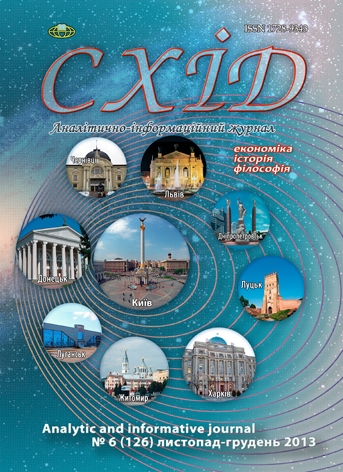The corporative strategy and globalization: interconnections and challenges of the modern stage
DOI:
https://doi.org/10.21847/1728-9343.2013.6(126).20453Keywords:
world economics, globalization, corporation, strategy, corporative strategy, strategic goals of corporationAbstract
This article deals with processes of transformation of corporate strategies in the conditions of globalization. Its' main qualities, on the basis of study of different approaches to the essence of globalization, are determined - the formation of single economical area, format change of relations between different subjects, information and technical changes.
But together with generally accepted characteristics of globalization can be highlighted also discussion features which are difficult to identify by the degree of influence on the activity of today's corporations: unequal distribution of world income in favor of developed countries, financial, economic and political expansion of developed countries, deepening of cross-country differentiations by the level of economical development, trends to the disappearance of national features, etc.
It is grounded, that connection between globalization and corporate strategies found in process of strategic aims' achievement. However, at present stage, the most powerful TNCs can dominate over the aims of other economic agents.
Taking into the consideration the significant impact of globalization on the corporate strategy, it is necessary to talk about the unique combination of advantages or disadvantages of globalization of strategically oriented performance management within the enterprises themselves. The factor, which clearly negatively influences on the activities of one company, can create numerous benefits for other economic agent.
In similar conditions corporate strategy gradually transforming into the system of constant search of answers and decisions to the challenges, which arise in the dynamic global economic environment. However, the degree of f involvement of corporations in global economic processes can't be correlated with the impact of global factors on the effectiveness of corporate strategy. In the medium term, we can predict the revaluation of existing principles of developing and implementing corporate strategies in the part of consideration impact of "global" factors.
Downloads
References
Neil J. Smelser. The handbook of economic sociology / Neil J. Smelser, Richard Swedberg. - [2nd ed.] - Princeton University Press, 2005. - 752 р.
Радаев В. В. Экономическая глобализация: Содержание и противоречия / В. Радаев // Вестник Московского университета: Сер.6: Экономика. - 09/2008. - № 5. - С. 3-13.
Гальчинський А. Методологія аналізу економічної глобалізації: логіка оновлення / А. Гальчинський // Економіка України. - 2009. - № 1. - С. 4-18.
Глобалізація і безпека розвитку: [монографія] / [кер. авт. кол. і наук. ред. О. Г. Білорус]. - К. : КНЕУ, 2001. - 733 с.
Иноземцев В. Л. На рубеже эпох. Экономические тенденции и их неэкономические следствия : сборник / В. Л. Иноземцев. - М. : Экономика, 2003. - 776 с.
Кастельс М. Информационная эпоха: Экономика, общество, культура / М. Кастельс ; [пер. с англ.]. - М. : Высш. шк. экономики, 2000. - 608 с.
Делягин М. Мировой кризис. Общая теория глобализации / М. Г. Делягин. - [3-е изд., перераб. и доп.]. - М. : ИНФРА-М, 2003. - 768 с.
Прикладные аспекты глобализации : материалы постоянно действующего междисциплинарного семинара Клуба ученых "Глобальный мир". - М. : Изд. дом "Новый век", 2001.
Parker B. Globalization and Business Practice: Managing Across Boundaries / B. Parker. - London : Sage Publishing Ltd, 1998. - 655 p.
Beck U. Was ist Globalisierung? / U. Beck. - Frankfurt a. M.,1999.
Khanna T. Emerging Giants: Building World-Class Companies in Developing Countries / T. Khanna, K. Palepu // Harvard Business Review. - 2006. - October. - Рp. 60-69.
REFERENCES
Neil J. Smelser and Richard Swedberg (2005), The handbook of economic sociology, 2nd ed., Princeton University Press, 752 р. (engl).
Radayev V. V. (2008), Economic globalization: Content and contradictions, Bulletin of Moscow University, Ser.6: Economics, The Science Journal, № 5, pp. 3-13 (rus).
Halchynskyi A. (2009), The methodology of economic globalization’s analysis: logic of update, Ekonomika Ukrainy [Economics of Ukraine], № 1, pp. 4-18 (ukr).
Bilous O., ed. (2001), Globalization and Development Security, monograph, Kyiv National Economic University, Kyiv, 733 p. (ukr).
Inozemtsev V. L. (2003), At the turn of the era. Economic trends and non-economic consequences, Moscow, 776 p. (rus).
Castells M. (2000), Informational era: Economy, society, culture, trans. from English, High school of economics, Moscow, 608 p. (rus).
Delyagin M. (2003), The world crisis. General theory of globalization, 3rd ed., INFRA-M, Moscow, 768 p. (rus).
Applied aspects of globalization: Proceedings of a permanent interdisciplinary seminar Club of Scientists «Global Peace» (2001), Moscow (rus).
Parker B. (1998), Globalization and Business Practice: Managing Across Boundaries, Sage Publishing Ltd, London, 655 p. (engl).
Beck U. (1999), Was ist Globalisierung?, Frankfurt a. M. (ger).
Khanna T., Palepu K. (2006), Emerging Giants: Building World-Class Companies in Developing Countries, Harvard Business Review, October, pp. 60-69 (engl).
Downloads
Published
How to Cite
Issue
Section
License
Copyright (c) 2014 Oleksandr Biriuk

This work is licensed under a Creative Commons Attribution-NonCommercial-NoDerivatives 4.0 International License.
1. Authors bear responsibility for the accuracy of facts, quotations, numbers and names used.
2. Manuscripts are not sent back.
3. The publisher does not always agree with the authors' opinion.
4. The authors reserve the right to authorship of the work and pass the first publication right of this work to the journal under the terms of a Creative Commons Attribution-NonCommercial-NoDerivatives 4.0 International License. This license allows others to distribute (copy) the published work for non-commercial purposes, provided there is mandatory attribution to its authors and a link to the first publication in our journal.
5. The authors have the right to conclude separate supplement agreements that relate to non-exclusive work distribution in the form in which it has been published by the journal (for example, to upload the work to the online storage of the journal or publish it as part of a monograph), provided that the reference to the first publication of the work in this journal is included.

